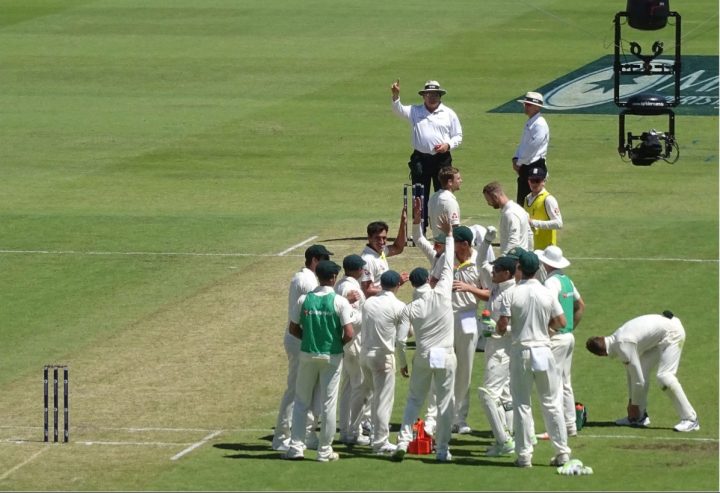What goes round comes round. Or so it seems. Giles Clarke, the < cough > controversial < cough >, former chairman and now president of the ECB has been summoned by the Commons culture, media and sport select committee. He’s been asked to explain the ECB’s role, and presumably his personal role as ECB supreme leader, in 2014’s shameful big three stitch up at the ICC. How embarrassing.
Although the official line is that the select committee has talked to various sporting figureheads (including Greg Dyke about FIFA corruption, and Seb Coe about IAAF doping scandals), this demonstrates that the wider community has finally twigged that all was not well at the ICC in 2014. The very fact that the big three stitch up being mentioned in the same breath as the FIFA and IAAF scandals speaks volumes.
Clarke will be asked to explain why the ICC’s biggest members carved up international cricket’s revenues behind closed doors, in what was intended to be a clandestine meeting, and then presented their plan to the other members as a fait accompli.
As was reported at the time by a handful of responsible journalists, the plan effectively centralised power and wealth in the hands of the India, England and Australia, despite the dire consequences this would have for world cricket in general. Veteran cricket writer Scyld Berry called it “the worst thing that has ever happened” to cricket. Few right-minded people would disagree.
Global sporting bodies are supposed to represent the interests of all parties. They’re supposed to grow the global game and think about the general good. Anything else is quite frankly a disgrace. Giles Clarke will be asked precisely why he co-authored the Big Three stitch up (alongside the now discredited N Srinivasan) even though he should’ve been aware of the consequences of his actions.
The problem for Clarke, as far as I can see it, is that he candidly admitted in Death of a Gentleman, that he believed his responsibility as ECB chairman was purely to look after his own board’s interest. How can he claim to have had the global interest of the game at heart when he’s already admitted on camera that he didn’t?
Leading the recent charge has been MP Damian Collins, who took part in the Change Cricket protest outside the Oval test match last year. Collins helped to arrange a special showing of Death of A Gentleman at the House of Commons last night. The screening was well attended.
Aware that Sharshank Manohar, the new ICC chairman, intends to reverse many of Clarke, Wally Edwards and Srinivasan’s reforms – something we feel is a really positive step – Collins wants to know what the ECB’s vision for world cricket entails. As reported in The Guardian, he wrote an email to new ECB chairman Colin Graves last week:
England, along with India and Australia, are the most influential boards at the ICC. In August I accused them of orchestrating a back-room power grab that saw these three countries taking over the game at the expense of the other 102.
We welcome the news from the recent ICC board meeting that the ICC is considering governance reform but we want to know what the ECB thinks that reform should look like.
It is hugely important that cricket does not miss this opportunity to embrace meaningful reform, and that the ECB are at the forefront of ensuring that the international game gets the independent, transparent and accountable governance it deserves. And if the ECB disagrees, we need to know why.
The hope is that pressure from the select committee will force the ECB to help facilitate meaningful reform rather than merely paying lip service to it (or even opposing it). The ECB has had its reputation dragged through the mud over the last two years, so it would make sense for them to get with the programme and repair their somewhat elitist and aloof reputation.
With politicians now paying close attention, I really hope that Graves takes this opportunity to do the right thing. We have a new regime on the field, with a team playing more attractive cricket, so one can only hope that the board becomes more attractive to disillusioned and essentially disenfranchised supporters too.
Unfortunately however, it’s hard to see how there can be a clean slate while the foul stench of Grand Moff Tarkinesque characters still lingers. The first thing the ECB did when hearing the news of Clarke’s summons was issue a typically bland statement:
The England & Wales Cricket Board is aware of interest from the Select Committee for Culture, Media & Sport to look into the governance of international cricket. The Committee has already spoken to a number of sports bodies in their on-going enquiries into the governance of international sport and we would welcome the opportunity to talk with them in the coming weeks.
I guess we shouldn’t have expected anything else – bodies always give statements like this when under scrutiny. But let’s just get one thing straight. Nobody at the ECB actually ‘welcomes’ a discussion about its role in one of the most disgusting coups in cricket history. It’s embarrassing and very unwelcome publicity indeed.
It will be interesting to see how Giles Clarke presents his case to the select committee. He’ll either have to defend the indefensible or admit, with the benefit of hindsight, that he made a horrible mistake. Either way it should make compulsive viewing for Clarke’s critics. I sure hope they show it on BBC Parliament.
James Morgan









He will be as slippery as an eel and probably end up smelling of roses! Please forgive my cynicism.
Nothing less than permanent exile to Patagonia will do! Better still, Tierra del Fuego!
Clarke really isn’t controversial – everyone agrees he’s a complete **@@…
This is very good news as it will force Clarke on the record on a range of matters he would rather keep quiet and which (DoaG excepted) journalists have been too polite and deferential to ask him. The presence of Damian Collins on the committee is a big plus as he knows the detail of the big three stitch up and of the shocking behaviour of the ECB more generally.
If it really is true that the ICC is going in a different direction, this could be the last nail in the coffin of the ancien regime. I hope the committee makes the most of it.
The MSM coverage is most peculiar – the Mail and the Guardian have both reported it (although the latter didn’t use it as its weekly ‘The Spin’ subject and has enabled no comments) but the BBC and the Independent have no story on it at all. Is the ECB being summoned to the House of Commons such an everyday event it isn’t worth a story? The Telegraph haven’t covered it either – but they’ve been on the ECB’s case and it seems more a case of the story unfortunately coinciding with a holiday for Nick Hoult there.
Select committees are best at getting information and attracting attention to an issue. Their questioning of witnesses can be effective (especially if there is a member of the committee who knows their stuff, as Damian Collins appears to do here) but the convention that all eleven members ask questions can lead to promising lines of inquiry being lost. They can be televised but it is up to the broadcasters if they show them live. The biggest weakness of select committees is that their conclusions appear in the form of a report which has no formal status and are often just ignored (parliament as a whole doesn’t even allocate time to debate them).
Interesting info Simon. Thanks for the input.
Ever time I see a photo of him he looks more and more like a less charismatic version of Jabba the Hut.
Nothing will come of it sadly, journalists are under the thumb of the icb/ecb and as all career driven people are.. Are yes men. Sadly, yes men aren’t what business and especially sport needs
I’m not quite sure I get this:
1) Clarke is going to be questioned by MPs, not journalists. The one thing MPs can be accused of is being two years too late in doing this, but not that they are beholden to the ECB.
2) Plenty of journalists are critical of the ECB – not just the cricinfo team (Dobell, Kimber, Miller) but Mike Atherton, Nick Hoult, Scyld Berry and Lawrence Booth have all been highly critical. What is weird is that most of the criticism is from the traditional ‘Tory press’ whereas most of the silence (or even praise) is from the once ‘liberal media’ of the Guardian, Independent and BBC.
Here’s some reaction to the Commons’ screening of DOAG:
https://www.youtube.com/watch?v=NfA35ozrGic
Thanks for that Simon. Definitely worth watching. Good luck to the DOAG team.
It won’t work and only a fantasist thinks it’ll have any effect what so ever. So if Clarke goes, he will be replaced by a similar character (because those types climb up the ladders) ! Meaning nothing will actually change other than perception (which is king) !
I think Simon you are picking up on the way he has expressed his opinion rather than working out what he was trying to say. I agree that journalists aren’t subjective or independent any longer but unfortunately the majority of people (as we prove here) do not understand this, or even care. They will simply read the journalists that most closely matches their theory or thoughts.
MP’s are just as bad and we all know that. Over the last few years we’ve had the evidence that they are not up to the tasks and lack the ability to be subjective and objective. Each has their own agenda they will take to move their careers one.
It’s simply the case that the public need people to question organization’s who are willing to make that ‘career limiting’ thing…. sadly, very very very few are willing to do this. I can understand why because society is very much ‘keep up with the jones’s’ now.
Downwiththeecb (great user name!) – are you saying there’s no difference between Clarke and, say, David Morgan his predecessor? I’m not expecting someone who can climb to the top of the greasy pole of as dysfunctional a body as the ECB to be some sort of secular saint, but it isn’t too much to hope that they at least have some commitment to growing the game. The RFU in rugby isn’t exactly without fault but at least the “old farts” aren’t trying to shrink rugby.
Arvish – I’m not sure who you mean by “he” in your first sentence. There are plenty of self-serving rogues among UK MPs – but Damian Collins was at the Oval protest this summer and I cannot see what he hoped personally to gain from that or by showing DOAG in Parliament, so I’m giving him the benefit of the doubt at this time.
From my experience no. While people are all different, in any organization the same types of people climb to the top. No, I don’t mean they are good.. I simply mean they must have the same (by enlarge) the same motives as each other..
Previous ones are driven by money regardless and I expect the current and next ones to be the same unless there are whole sale changes (which some random MP who jumped on his soap box won’t change in any way).
It’s defeatist but having now spent some time looking at this industry it’s not good in any way. As a massive cricket fan, I’ve been massively disheartened.
This will do nothing for the sport other than make a media show of doing the right thing. It’ll have zero impact and the ECB will continue to do whatever they need to to make more ££